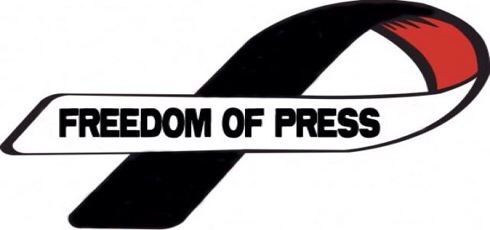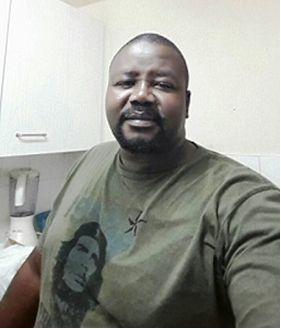At The John Akar Memorial Lecture Series Seaga Shaw lectures public on humanitarian journalism
Senior Lecturer in Media and Politics at Northumbria University in the UK Dr Ibrahim Seaga Shaw (in photo) delivered the third John Akar Memorial Lecture series on ‘Journalism and the Political Economy of Humanitarianism’ organised by the Sierra Leone Broadcasting Corporation (SLBC) at the British Council in Freetown on May 15.
The Lecture was broadcast live on Radio and TV. Talk show host Samuel Valcarcel reminded the audience that John Akar was the first indigenous director General of the then Sierra Leone Broadcasting Service (SLBC).
Alice Conteh of the SLBC introduced the chairman of the occasion Mr. Tomia Hamilton; himself a professional journalist and academic, who was full of praise for the guest lecturer Dr. Seaga Shaw for his academic achievements. Dr Shaw, thanked the SLBC for honouring him with this invitation to deliver the third of this very important lecture series.
POLITICAL ECONOMY
Dilating on the theory and practice of political economy, the PHD holder of the prestigious Sorbonne university in Paris France, Dr Seaga Shaw, a media scholar and practitioner, pointed out that news media commercialization where political and economic interests are prioritised can greatly influence or compromise news reporting and humanitarianism
Dr, Shaw called this journalistic complicity which clashes with the tenets of human rights journalism when it comes to reporting violence, especially indirect structural and cultural violence such as poverty, forced migration, domestic violence, human trafficking, famine, youth marginalisation, starvation etc.
EVOCATIVE REPORTING
The jam packed British Council Hall audience listened very attentively when the internationally respected academic and journalist defined evocative reporting as the reporting of the dramatic side of an event to raise concern and whip up support for raising donations for charity
Diagnostic reporting on the other hand, Dr. Shaw maintained, looks beyond the hard facts or raw material of an event and delves into why it what happened in the first place. He emphasised that diagnostic reporting of human rights violations leading to humanitarian crisis is more important because it helps to shed light on the root causes of conflict which is needed to put an end to conflicts, or prevent future conflicts from happening.
COMPASION FATIGVE
The lack of the above discipline(diagnostic reporting) brings into play distance framing of stories in most of the media, Dr Shaw noted, ultimately culminating in compassion fatigue where people get tired of seeing the same evocative images of suffering and then switching off leading to a kind of disconnect from the suffering people.
New media and celebrity humanitarianism was brought into focus citing the case of Bob Geldof and his worldwide musical charity campaign for the victims of draught and famine in Ethiopia. Dr Shaw however said that celebrity humanitarian activists have been criticised for using the plight of suffering distant people to market themselves and their artistic products which is all part of the political economy of humanitarianism. Dr. Ibrahim Seaga Shaw stressed that investigative journalism can support human rights journalism in that it can help journalists to go beyond stereotypes and avoid distortion of humanitarian realities.
Touching on clear cut case of political economy of humanitarianism, Dr Shaw questioned how former US President George Walker Bush was spotted on TV gleefully playing guitar while Secretary of State Condoleezza Rice went on a shopping spree in a Manhattan mall when Hurricane Katrina ravaged New Orleans and left thousands of poor people homeless and destitute. He said the initial reporting by the American media was of a critical diagnostic nature criticising the politicians for neglecting the suffering poor in New Orleans in the wake of the Hurricane but said this suddenly changed when the media yielded to government spinning of the story as just one of looting and raping by some mad poor black people. Dr Shaw observed that this distracted the attention of the public from the poor response of the government to handling the disaster to the purely exaggerated story of looting and raping. He also cited the case of Rwanda were Western politicians and their humanitarian relief agencies helped to divert media and public attention from the genocide that was unfolding in the Rwandan capital Kigali and elsewhere in Rwanda to the outbreak of cholera in the refugee camps in Goma, eastern Zaire (present day D R Congo), populated by Hutus who were ostensibly involved in carrying out the mass killings. What Is more, he noted, the UN concentrated on Bosnia and Herzegovina with all the world media attention while French troops stood by allowing the massacres to go on in Rwanda.
Dr Shaw recalled when former BBC West Africa correspondent, now World Affairs Correspondent, Mark Doyle got former UN High Commissioner for Human Rights and former Prime Minister of Ireland, Mary Robinson to acknowledge that the crisis in Sierra Leone was more serious than that in Kosovo at least in terms of number casualties, and yet the UN did not pay quick attention to it but rather focused all their attention and resources to the conflict in former Yugoslavia for geo-political, economic and cultural reasons. Who cares about Africans killing themselves? They asked rhetorically at the time!
Former Deputy Minister of Information and Communication and journalist, and now Deputy Minister of Internal Affairs, Sheka Tarawallie (Shekito) could not help shaking his head when Dr. Shaw recalled the ordeals himself at Expo times and other colleagues like himself (shekito) who shared the vision of a peaceful resolution of the Sierra Leone civil war faced in the 90s during and after the rebel war.
‘’ At that Time,’’Dr. Shaw recalled,’’ when we called for a peaceful revolution to the conflict we were branded collaborators and targeted for death; these are some of the dangers of advocacy journalism, which journalists struggle to balance with their professional standard of objective journalism”. He cited the famous BBC correspondent in Bosnia, Martin Bell as saying that while it is important to be objective you cannot be neutral when it comes to deciding to choose between evil and good or the devil and the angel, Dr Shaw said his newspaper took the side of peace against war and for that he and his colleagues paid a heavy prize by facing imprisonment and death threats.
Stay with Sierra Express Media, for your trusted place in news!
© 2014, https:. All rights reserved.






